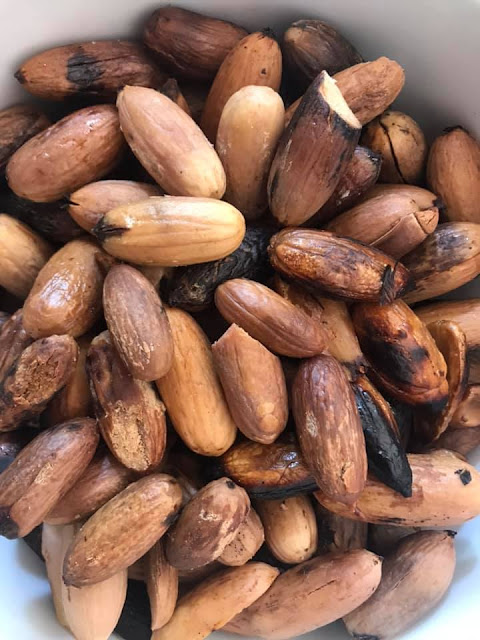In a recent Facebook post asking about tips for achieving more self-sufficiency, I responded that my recent return to an interest in acorns had led to discoveries which theoretically make us 100% self-sufficient for food if we care to be. Then I was asked
to which I responded:For the roasting method, that 1a2 step is very important! Acorns with a lot of moisture inside can burst explosively if there is nothing - like a cut in the nut - to allow steam to escape. And the uncut ones that don't burst often have their texture and taste ruined by excessive steaming inside the intact shell. With a cut, the shells will split wider and dry, so that acorn meats often simply fall out intact."Our acorns are quite low in tannins as I mentioned, so depending on what you're working with changes may be needed. I am having trouble sourcing bitter acorns here, so there it's more theory than verified practice.
"Completely forget all those stupid hot water (boiling methods). Forget the streams and toilet tank BS for the cold extraction methods.
"1. Shell acorns. The fastest method for this is roasting, but if you want to avoid that
"(a1) dry for a while or in a desiccator and
"(b1) Cut lengthwise (wear butcher's gloves and use a narrow, long knife, employing the tip end as a fulcrum) and pry out the nut - a grapefruit spoon is the best aid I've found for difficult cases, and its serrations can be useful for scraping off bad bits
"OR, for roasting
"(a2) cut a lengthwise slit in the acorns, drop into water to soak for some hours (I sometimes use a modified olive slitting tube with two cutting vanes removed) and
"(b2) roast in a cast-iron pan over a campfire or in a fireplace for that nice smoked tang or roast for maybe 15-30 minutes in the oven at 230 degrees C or so; the roast is done when the slits open wide, some so much so that the nuts just fall out. Don't worry if the acorns become very dark, even black - they are carmelized, not burned usually - yum!
"2. Then taste the acorns, and if bitter, drop into water in a 1 gallon plastic water bottle or other container; soak and change water every half day or day, tasting each time until you feel that the debittering is completed to your satisfaction.
"3. Take the nuts, dry them briefly and grind them in blender, using a sieve/screen to sift the fine flour from the grits, the latter being a good form to roast as an ersatz coffee. Use fresh/moist within a week or so, dry it for longer storage at ambient temperature or freeze it for use months or years later (depending on your freezer conditions)...."
"... woke at 5 am, put on my robe and gathered acorns from the terrace as it rained, and as I washed and slit the fresh nuts to prepare for roasting in the fireplace, to open them up, make them easy to shell and convert to acorn flour, the main part of our breads and other dishes for a few weeks now, I found myself singing "Imagine" quietly as I pictured industrialized monoculture fields of wheat gone from our landscapes, replaced by groves of oaks in guild permacultures, once again giving renewable wood for fuel, crafts and construction, cork bark to keep us warm in insulated walls and to hold our fruit harvest wines in their flasks, and producing their regular crops of acorn grains above, squashes and hops (for acorn beer) climbing those trees and the understories of lesser trees, fruit bushes, herbs and fiber plants spread below and between them, asparagus close in and peeking through shrub twigs, truffles below the earth, and the sounds of a thousand birds at every level of branches and across the ground. Imagine that. It's easy if you try."


No comments:
Post a Comment